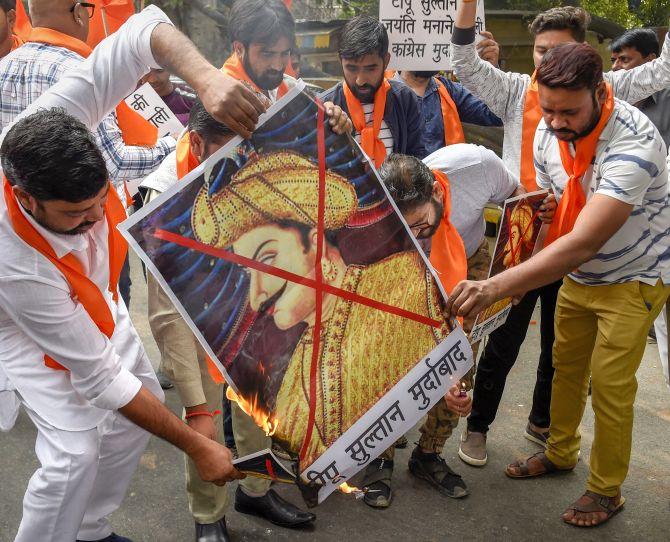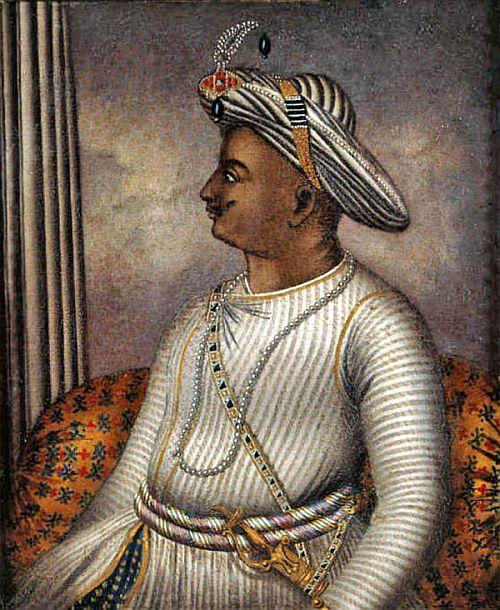'Tipu Sultan may have had his flaws, but that does not mean he can be axed from textbooks.'
'Besides, if it is Tipu today, who will it be tomorrow?' asks Shuma Raha.

There is a stunning headless torso of Roman emperor Nero at the Museo Civico Archeologico in Bologna, Italy.
Exquisitely carved in marble, the statue, which dates from the 1st century AD, was erected in Bononia (the ancient name of Bologna) to honour Nero who financed the rebuilding of the city after a fire destroyed it in 53 AD.
Scholars believe the statue lost its head not because of the ravages of time, but because it was deliberately removed in accordance with the ancient Roman practice of damnatio memoriae -- the destruction of images of important persons who were deemed enemies of the State after their death.
The idea was to obliterate every trace of the person from official records and erase his memory from the collective consciousness of the people. Needless to say, Nero survived that effort. History remembers him as a Roman emperor who came with his share of evil and good.
The BJP-ruled government of Karnataka is at present engaged in a spot of damnatio memoriae of its own. And its target is none other than Tipu Sultan, the 18th-century king who ruled over large parts of the area that is now Karnataka.
Chief Minister B S Yediyurappa declared that his government was considering removing all references to Tipu Sultan from school textbooks. Earlier, the state had cancelled Tipu's birth anniversary celebrations which were to be held on November 10.
The recent edicts are in line with the Hindutva brigade's longtime hatred of Tipu Sultan.
Indian history portrays the ruler of erstwhile Mysore as a hero and a braveheart, one who fought the British and resisted the East India Company's advance into the South before being killed in the battle of Seringapatam in 1799.
The ruling dispensation of Karnataka and others in the Sangh Parivar reject this view. According to them, Tipu was one of history's mega nasties who persecuted his Hindu subjects. And hence their demand that he be expunged from textbooks.

It is for scholars to determine whether or not Tipu was Tipu the Terrible.
Yes, historians have their own biases and different scholars may come up with different interpretations of the same historical subjects.
And yes, the rewriting of history is something that states try to do from time to time, either to glorify the nation or whitewash a shameful episode in its past.
Japan, for instance, has largely denied that it massacred hundreds of thousands of people in Nanking in 1937-1938 during the second Sino-Japanese war.
But the attempt to white out an important historical figure, a native of one's own soil, more than 200 years after his death, on the charge that he was a cruel tyrant, speaks of a boneheaded primitivism, a flagrant disregard for the nation's history, that is outrageous, to say the least.
Tipu Sultan may have had his flaws, but that does not mean he can be axed from textbooks. History is not only about blameless demigods. Besides, if it is Tipu today, who will it be tomorrow?
The ruling party has made no secret of its intention to further the RSS agenda of rewriting history in order to assert the glory and primacy of Hinduism and Hindu culture above all else.
The demonisation of Muslim rulers (Tipu included), the rechristening of cities, railway stations and roads that bore Muslim names, textbooks in Rajasthan tweaked under the state's erstwhile government to say that Maharana Pratap defeated Akbar's forces in the battle of Haldighati (instead of vice versa) or the laughable assertion that the Taj Mahal was not built by Shah Jahan (as one prominent RSS ideologue said on a television talk show some years ago) are all part of this effort.
Last month Home Minister Amit Shah stated that India's history should be rewritten from India's point of view. Indeed it should be.
But if that point of view involves the demonisation, or the complete erasure, of historical figures who are deemed to be the 'other', if it involves the distortion of historical facts, then it becomes a dangerously false narrative that demolishes the idea of a pluralistic, multicultural India.
The question is, does propaganda and distorted narratives about the nation serve the interests of the state? Does it enthuse people, especially the youth?
History shows that it does -- but only upto a point.











 © 2025
© 2025